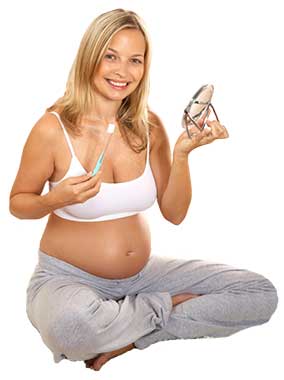Can oral bacteria in an expectant mother really affect her baby? Sadly, more research is coming forward that demonstrates a link between build-up of oral bacteria and problems in pregnancy—such giving birth to a pre-term or low-birth weight baby. In Australia, about 8% of babies are born prematurely every year, at rate that is continuing to rise.
When a woman becomes pregnant, she knows it is important to maintain a healthy lifestyle to ensure both the health of herself and the health of her baby. New clinical recommendations from the American Academy of Periodontology (AAP) and the European Federation of Periodontology (EFP) urge pregnant women to maintain periodontal (gum) health as well. Research has indicated that women with gum disease may be at risk of adverse pregnancy outcomes, such as giving birth to a pre-term or low-birth weight baby due to the presence of certain bacteria in the mouth when gums are inflamed.
Pre-term births have increased significantly during the last 20 years according to the Australian Bureau of Statistics (AIHW). The primary cause is intrauterine infections, which have previously been thought to result from bacteria entering the uterus through the genital area. However, new studies are finding that bacteria typically found in the mouths of expectant mothers can enter the uterus as well. You see, when gums are irritated by bacteria-filled plaque they start to bleed. This bleeding opens up a pathway for oral bacteria to enter the bloodstream and then infect internal tissues like the heart, blood vessels and uterus. An infection like this of the uterus can then lead to late miscarriages and stillbirths, as well as pre-term births.
An article published in 2010 in the journal Infection and Immunity reported on studies carried out at Case Western Reserve University in Ohio, USA. By working with pregnant mice, researchers determined which of the 700 or so species of bacteria that live in the human mouth are capable of migrating to the uterus. Out of the diverse group of bacteria colonizing the mouse placentas, the majority originate in the oral cavity and are associated with problems in human pregnancy.
According to the Centre for Disease Control and Prevention, babies with a birth weight of less than 2.5 kilos may be at risk of long-term health problems such as delayed motor skills, social growth, or learning disabilities. Similar complications are true for babies born at least three weeks earlier than its due date. Other issues associated with pre-term birth include respiratory problems, vision and hearing loss, or feeding and digestive problems.
This increasing evidence reinforces the need for pregnant women to practice excellent oral hygiene at home, as well as get recommended professional check-ups and cleaning from a dentist and hygienist.
Pregnant women are also more susceptible to gum disease due to the circulation of pregnancy hormones – which makes this situation a 2-way street! If you have any tendency towards gum disease, it’s best to consult with your dentist and begin a treatment program as soon as you learn that you’re pregnant—or better still, before you become pregnant. Because it’s more than just your teeth… it’s the long and healthy life for your bub!
Related Post:
Don’t Let Your Kid’s Teeth Erode out of Kindness!
Sustainability in dentistry
4 things you may not know about your oral health
Baking soda’s drawbacks
Toothbrush care


